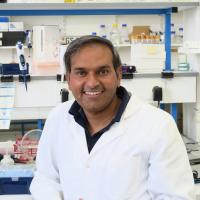
Agroecology Reading time 5 min
Rajeev Kumar at the heart of meiosis
Published on 06 July 2021
Rajeev Kumar sparkles when he speaks – brilliantly – about meiosis. This subject has shaped his life as a scientist for many years and particularly since he joined the Institut Jean-Pierre Bourgin (INRAE, AgroParisTech, ELR CNRS) in 2014. Read on to learn about the key stages of his career.
On the roads of Europe
In 2001, after obtaining a Masters in biochemistry at the Indian Council of Agricultural Research (ICAR), Rajeev Kumar left India for Germany, where he obtained his PhD in biology at AWTH Aachen University, studying the biosynthesis of vitamin E in rapeseed over a four-year period.
Upon completing his studies, Rajeev decided to pursue a career in France, where he worked at the Institut Pasteur (Paris), followed by the Institute of Human Genetics (Montpellier) and then at the Institut Curie (Paris).
Over the course of nearly 10 years, Rajeev has acquired solid experience and expertise in the fields of molecular genetics, cell biology and biochemistry, working on projects to study DNA repair and homologous recombination in organisms ranging from bacteria, yeasts and mammals. He has made numerous findings which have been published in renowned international journals.
Meiosis and crossover regulation
In 2014, thanks to his experience, Rajeev Kumar passed the Institute's recruitment exams and was hired as a researcher on Raphaël Mercier's "Meiosis and apomixis" team at the Institut Jean-Pierre Bourgin. At the heart of this very large unit specialised in plants and their products, which has 28 research teams and no fewer than 300 staff, Rajeev has gradually made his mark and gained independence.
Meiosis is a specific type of cell division by which gametes – sex cells – are generated in all living things – animals, plants, fungi – which reproduce sexually.
The process consists of two successive cell divisions which produce four daughter cells (the source of future gametes) carrying only half of the chromosomes of the parent cell. Immediately prior to the first division, homologous chromosomes pair with each other and certain components come into contact to allow the exchange of fragments of genetic material between chromosomes. These natural processes, called crossovers, contribute to the mixing of genetic information at the individual and species level. They also play an essential mechanical role in the correct distribution of chromosomes.
This genetic mixing can be studied in cultivated plants to develop the characteristics needed for new plant varieties or to obtain seeds strictly identical to the mother plant.
Today, at the head of a small team of four, including a PhD student and a post-doctoral researcher, Rajeev divides his time between writing projects and scientific articles, the research bench, and supervision. There is no shortage of work thanks to the partnerships he develops, in particular with Raphaël Mercier, who has gone to Germany to work on his numerous projects.
Model plants, an opportunity for understanding heredity
Year in, year out, Rajeev remains intangible: he is still as devoted as ever to meiosis, the mechanisms of which he explores using Arabidopsis thaliana, a model plant more commonly known as thale cress.
Homologous recombination plays a central role in the repair of DNA double-strand breaks, whether they occur accidentally in mitotic cells or are programmed during meiosis.
Crossovers (CO) resulting from the repair of meiotic breaks are essential to correcting chromosome segregation and increase the genetic diversity of offspring. However, the mechanisms regulating the formation of COs remain largely unknown.
The work of Rajeev and his colleagues has revealed the existence of at least three mechanisms limiting meiotic crossover, one of which involves a FIDGETIN-LIKE-1 (FIGL1) protein.
FIGL1 is conserved from plants to humans and is involved in regulating the early stages of DNA repair.
The research has also made it possible to identify a FIDGETIN-LIKE-1 INTERACTING PROTEIN (FLIP) and has shown that FLIP and FIGL1 form a protein complex, also conserved from A. thaliana to humans, which is thought to regulate the crucial DNA strand exchange step in homologous recombination.
Rajeev and his colleagues also demonstrated the antagonistic effects of BRCA2 and FIGL1 on RAD51 and DMC1 recombinases, two enzymes essential for accurate DNA repair by homologous recombination.
Over the years and through his projects, Rajeev has patiently unravelled the key components and functioning of the mechanics of meiosis. Fundamental and applied research in plant breeding comes together in the hallways of INRAE to face the major challenges of tomorrow.
The COVID pandemic has slowed the pace – in other words, has made us see things from another angle. Rajeev has been able to focus on writing his scientific papers, and enjoyed ample time spent talking with his students. For them, this obligatory interlude actually allowed them to prepare their work well and get off to a better start once the laboratories re-opened.
But all that seems an – almost – distant memory: Rajeev is now working to obtain Accreditation to supervise research, a ‘grail’ in the French scientific research world which recognises the candidate's “high scientific level, the original nature of his or her approach in a field of science, his or her ability to master a research strategy in a sufficiently broad scientific or technological field and his or her capacity to supervise young researchers". A prospect that Rajeev views with the serenity of a researcher who is well established in his professional and personal life and which augurs well for the future.
44 years old
Since 2013 INRAE research scientist
2012-2014 Post-doctoral studies at the Institut Curie, Paris
2007-2012 Post-doctoral studies at the Institute of Human Genetics (CNRS), Montpellier - AXA scholarship (March 2011 – September 2012)
2006-2007 Post-doctoral studies at the Institut Pasteur, Paris - Egide scholarship programme (2006)
2005 PhD in biology, AWTH Aachen University.
